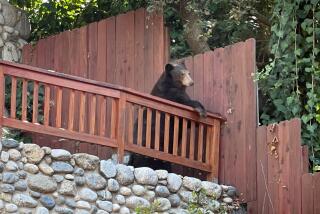A Honey of a Deal
Face it: We all like honey, but nobody wants to get too cozy with the bees.
Pressed with the task of finding a bee-friendly location in urban Orange County, a handful of beekeepers have decided to go where the people arenât.
The result has been an unusual partnership with the county that allows beekeepers to rent space for their hives in the more than 30,000-acre wilderness park system for a nominal sum.
Itâs a sweet deal: The beekeepers get the honey and the county receives an important environmental resource.
âBees are great for the wilderness habitat,â said Tim Miller, who manages county parks. âIt makes a lot of sense from an environmental standpoint.â
Although the county has allowed beekeeper access for at least 10 years, only three permits, which annually cost $100 plus $1 for each hive, were issued this year.
Vinciana Pasierb, a professional beekeeper who sells honey to local stores and maintains about 550 of the 950 hives located in three South County wilderness parks, commutes from Huntington Beach to tend the hives. She says itâs all worth it.
âWhen you have a hive in the city, you get a lot of complaints, and some cities have ordinances against keeping bees,â Pasierb said. âOut here [in wilderness areas], my bees also fill an important role in the ecosystem.â
Beekeeping and bees in general have been forced out of Orange County in the past decade because of development.
At one time, bees were shipped into the county by farmers to pollinate miles of orange trees.
But when houses and condos replaced orange groves, the number of bee colonies dropped dramatically from more than 6,000 colonies in 1987 to fewer than 600 in 1995, agriculture experts say.
In 1992, the Orange County Beekeepers Assn. had about 100 members. Today, about 45 people pay dues to the organization.
The groupâs current president blamed the overdevelopment of Orange County and an almost pathological fear of bees with making it hard for beekeepers to locate their hives.
âPeople are basically ignorant,â Lewis West said bluntly. âTheyâd rather stay that way than learn that they donât need to fear bees.â
Most members of the Orange County Beekeepers Assn. are amateurs who have half a dozen or fewer hives in their backyard, West said. Amateur beekeepers typically run into trouble when somebody moves in next door and discovers they have bees for neighbors.
âYou battle against natureâ to produce honey and avoid pests like ants from invading the hive, and âyou battle against your own local government,â West said. âThatâs why our members retire or just stop doing it. Weâve had very little fresh interest in beekeeping lately.â
Anaheim has prohibited beekeeping without a special permit since 1973. There have been 10 complaints about neighborhood beehives since 1992. All 10 resulted in the beekeeper simply ceasing bee activity.
However, none of the beekeepers asked the city for a permit, said Fred Fix, a senior code enforcement officer.
âPeople come to us when they want more animals than theyâre allowed, or to have an aviary,â Fix said. âWe will work with people.â
West, who has 30 hives scattered in locations as far south as Temecula, hadnât heard that the county will rent space in their wilderness parks and was intrigued by the idea. He said most amateur beekeepers probably wonât take advantage of the opportunity.
âTheyâre not going to drive two hours to the mountains to take care of a few hives,â he said.
Pasierb, who often gives presentations about bees to schoolchildren, and her husband and partner, Hamid Fard, make enough money from honey, bees and raising orchids to provide a comfortable living.
Each of her hives produces up to 150 pounds of honey annually. She charges about $3 for a 22-ounce jar. Pasierb also sells bee pollen, a yellowish chunky substance with a sweet, nutlike flavor, to health food stores and raises queen bees for other beekeepers.
Pasierb has kept hives in three wilderness parks for about six years. She finds it more challenging than tending bees in urban areas.
In the city, people tend to plant flora and fauna that bloom year-round, so bees are kept busy and honey production is continual.
Out in the wild, honey is made only during wildflower season.
âYou only have certain seasons, mostly the spring from March through June,â Pasierb said. âBut you can get the most wonderful flavors from the wildflowers, like sage.â
Pasierb, 39, remembers being fascinated by bees as a small child in the Pacific island of Bali.
âEven as a little girl, I loved nature,â she said. âI liked to wander and look at the bees and the butterflies to see what they were doing.â
More to Read
Sign up for Essential California
The most important California stories and recommendations in your inbox every morning.
You may occasionally receive promotional content from the Los Angeles Times.










